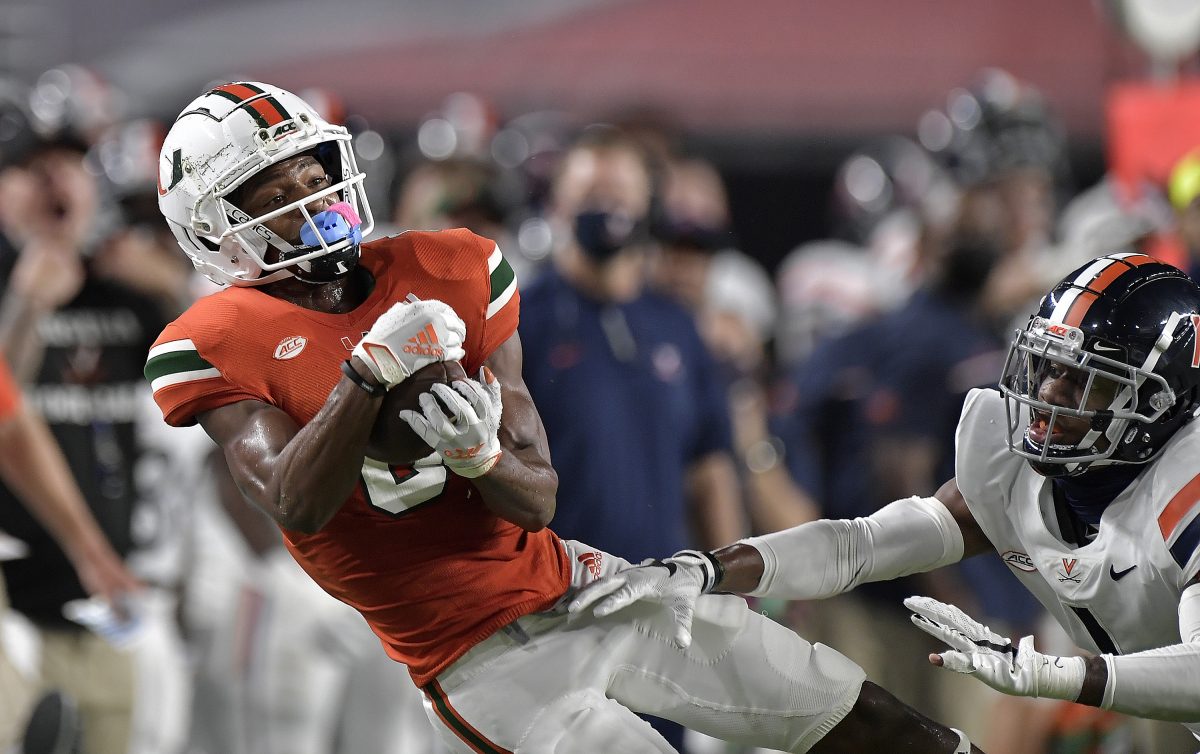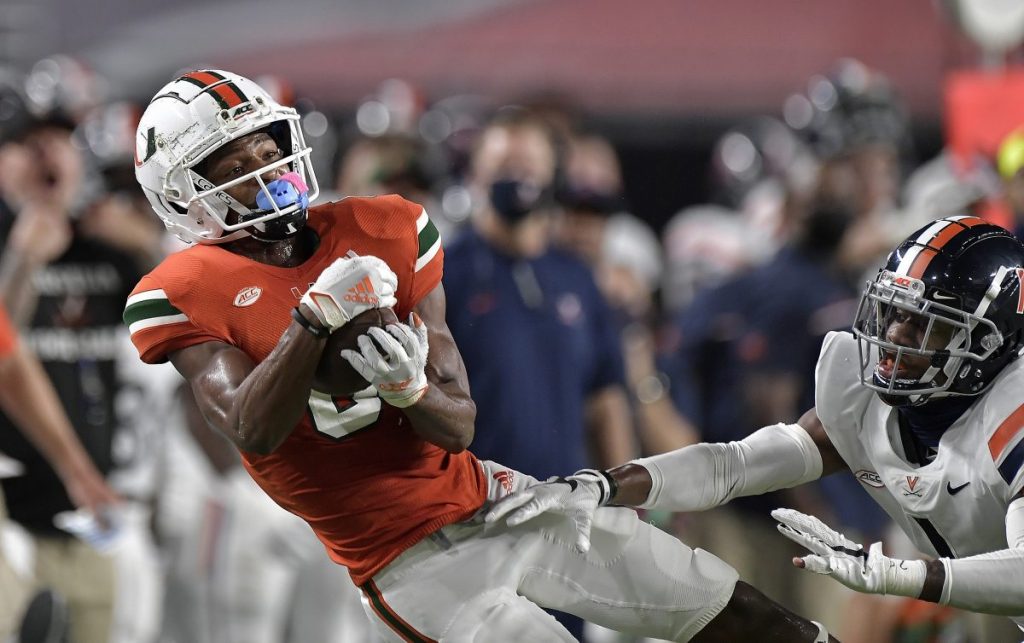

The weather perfectly illustrated the kind of game the Miami Hurricanes had to play in order to beat the Virginia Cavaliers at Hard Rock Stadium Saturday night. On-and-off downpours complicated aspects of the matchup for both teams, with UM playing through the choppy conditions in a far-from-perfect performance.
But it was enough to be ahead 19-14 when the clock hit zero in front of the 9,940 fans present in Miami Gardens. Hit with adversity before the game even began, the Canes (5-1, 4-1 ACC) struggled in some phases of the contest while excelling in others. Miami will get back to the drawing board with another win behind them as they head into the second half of the 2020 season.
“We have to be able to grind out wins when it’s just hard to win,” said head coach Manny Diaz. “And Virginia was making it tough.”
Down in numbers
Before kickoff, fans learned that a number of underclassmen would not be available for the game. On top of tight end Brevin Jordan (shoulder) being expectedly inactive, a slew of freshmen, including safety Brian Balom, linebacker Corey Flagg, defensive end Elijah Roberts, wide receivers Michael Redding III and Xavier Restrepo and quarterback Tyler Van Dyke, were all ruled out for undisclosed reasons.
There was no word on whether or not the absences were Covid-related, but with the six individuals all being part of the freshman class, a positive test and subsequent contact tracing are obvious guesses.
Diaz declined to elaborate on why they were unavailable.
“As you know, they were unavailable. That’s really all we can say about that,” Diaz said. Miami has not previously disclosed positive CovidQ tests.
Harley answers the call
Miami’s pass catchers came into Saturday’s game under a judgmental microscope. And rightfully so, as the unit had failed to consistently produce in the last couple of matchups. In the weekly depth chart released after the Pittsburgh game, no single pass catcher was listed as a certain starter, creating a new competition for game snaps.
Many of the up-and-coming receivers were part of the inactive group, leaving the week’s position battle unsettled come game time.
But Mike Harley stepped up to make things much easier for quarterback D’Eriq King.
“[Offensive coordinator Rhett] Lashlee sent a couple group texts out. He told us before the meetings started that no one had the job and that it was up for grabs,” said Harley. “Whoever has the best performance for the three or four days of practice will get the starting job. In the text, I reacted to it like, ‘Okay, I have to step up.’ Honestly, I shouldn’t be in that position, coming in as a senior, but coach had to make some changes and some guys have to make plays, so that is what we did tonight.”
“I think Mike absolutely accepted the challenge,” Diaz said. “[The receivers] wanted to be pushed and it’s not easy, especially when you’re a senior. But I’ve got to say, to Mike’s credit, the way he practiced was—he didn’t bat an eye. He was a great leader all week in practice, and it wasn’t surprising that he played well in the game.”
King went 21-30 passing for 322 yards. But Harley was a major contributor to his passer’s final line, catching 10 passes for 170 yards, including a 43-yard score on the first drive of the game.
Harley will need to continue to lead by example in a receiver room filled with many younger players.
Defense bends at times, but rarely breaks
The Hurricanes allowed Virginia to march 64 yards on their first drive for a touchdown. UM bent but didn’t break the rest of the first half, trying to slow down the Cavaliers’ exotic three-quarterback scheme.
“I felt like our guys, in the first half, never really got our cleats screwed into the ground where we really felt like we could play,” Diaz said. “They were always having us off-balance.”
Once again late in the contest, a blown coverage allowed UVA’s Ra’Shawn Henry to easily catch a 35-yard touchdown.
But the defense did its job for most of the night, limiting the Cavaliers to just 14 points. Virginia didn’t convert a third down in the second half, and held the ball for just 11:14 in the final two quarters.
“When our backs are against the wall, we try not to panic,” striker Gilbert Frierson said. “Just play the next play, no matter what happened on the previous play—just to fight. It’s another four downs. When a long play happens, as long as we get them on the ground, we get another [chance to get a] stop on defense and that’s all we focus on, that next play.”
Still, the Canes allowed 366 total yards and failed to force a turnover—an identity of their defense—until the final defensive play.
Trench battle favored UVA
All week long, the receiving core had been criticized for its inconsistencies in recent matchups.
They are not the only position group in need of a wakeup call, as the offensive line left much to be desired Saturday night.
In the first half, the Cavaliers sacked D’Eriq King four times and recorded six total tackles for loss for 27 yards. By the time the game concluded, UVA’s TFL total stood at 11. In comparison, UM had just two TFL all night. Virginia also more than doubled Miami’s yards per rush output—5.3 to 2.5.
Twice, offensive drives stalled in the red zone, short of the end zone, largely due to ineffective blocking. The second quarter saw UM go from having the ball at their Virginia 18-yard line, to having to kick a field goal on 4th & 18, only to have the kick blocked. In the third quarter, the Canes had 1st & goal from the 4-yard line, only to be denied a touchdown after three straight running plays. Miami had to settle for three points.
Overall, poor blocking in the red zone led to leaving at least 10 points on the field.
Miami turns game into track meet
The Hurricanes were inconsistent running the ball the entire game, gaining just 122 yards on the ground. However, they found some rhythm on offense after halftime through the air.
Consecutive scoring drives turned a 10-7 advantage into a two-score game. The possessions combined to take up 28 plays and 10:15. But it was the passing game that became the default at this point in the matchup. The Canes had eight passing plays where they gained at least 20 yards Saturday, taking much of the pressure off the players up front over the course of the game.
Virginia head coach Bronco Mendenhall admitted UM’s speed was an issue for his team.
“Miami goes really fast,” Mendenhall said. “I looked out and thought our chances were diminishing based on the fatigue and how fast they [the Hurricanes] were going.”
Lack of safety depth hurts
Before kickoff, Miami announced that freshman safety Brian Balom (among other first year players) would be unavailable for the game. This seemed to be merely a loss of depth before the game, but things took a turn for the worse when Amari Carter was ejected for targeting on the first defensive play from scrimmage. It was Carter’s second ejection for targeting of 2020. Things would have been even more dire had Bubba Bolden been called for a similar foul late in the first half, which TV replay appeared to show he had gotten away with.
“It’s ‘next man up’ and also ‘play the next play’ mentality,” defensive end Jaelan Phillips said. “Whether it was Amari [Carter] getting knocked out or the rain starting to come down, those are all things that you can’t control. At the end of the day, you have to control what you can control, and I think that’s what we did out there.”
Still, the Canes were able to compensate for their deficiencies Saturday. Frierson was moved back into his natural pure safety position for many snaps. But most importantly, UM’s defense took more control of the line of scrimmage after halftime, which translated throughout the entire side of the ball.
Up next
Miami heads into their second bye week of 2020 still in the thick of the ACC standings. They’ll hope to get their unavailable players back before returning to action next in Raleigh, NC to take on the North Carolina State Wolfpack. The Canes are 0-4 after off weeks in the Manny Diaz era, so the game on Nov. 6 represents a big benchmark for UM. With one loss in conference play already, little margin for error remains in any of their five remaining games if they seek to make the conference championship.





